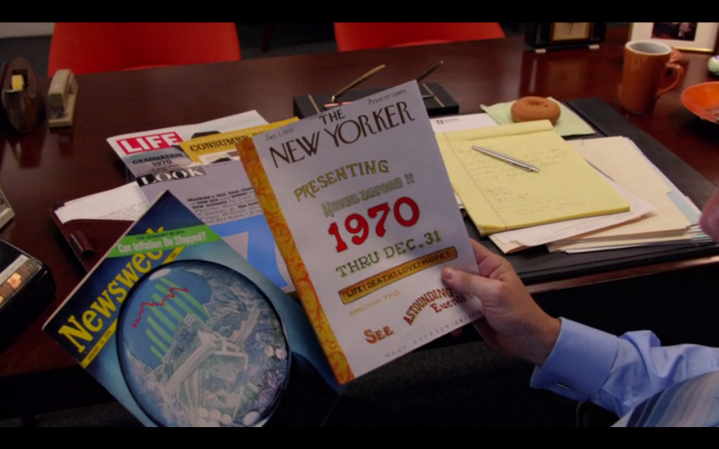Mad Men 7×10: History Repeating
We spent last week with Don Draper wallowing in the past, repeating old patterns, steadfastly refusing to change. And then this week’s episode pulled the apartment out from under him–maybe Don doesn’t want to change, but the universe doesn’t always give you that much choice in the matter.
Don comes up blank when Roger asks him to write a speech on SC&P’s future. He’s not a guy that thinks very far ahead, it’s Don’s inability to look past what’s immediately in front of him that causes him to act so impulsively, and to repeat so many mistakes, so it’s hardly surprising that he doesn’t know where to start with Roger’s speech; he organizes his thoughts to start writing by requesting an SCDP press release from 1963, and he quotes the Gettysburg address, “four score and seven years ago.” Don’s tasked with looking forward, but instead he’s reaching back, rooting around for something he can use. And when that doesn’t work he starts taking an informal poll.
Ted, such a sad-sack these days, just wants to land a pharmaceutical client. He talks about it like it’s as wild a fantasy as running off to join the circus, but Don finds his thinking disappointingly small. Peggy’s hoping for big clients, too, but her dreams are more for herself than for SC&P at large. She wants to be the agency’s first female creative director–she wants Don’s job. And she wants acclaim, fame; while Don sneers at that a bit she’s not ashamed to want it, or ashamed to confess to wanting it. And she wants to build something meaningful; she’s still an idealist at heart.
Meredith thinks the future will be like the World’s Fair.
And it’s not just the people Don asks that are looking ahead. Lou Avery, out in the LA office, is pursuing his cartooning dreams with Hanna-Barbera. Joan is exploring a potential relationship with an older man. Betty is getting ready to go back to school. Glen, having flunked out, is exchanging an education to go fight in Vietnam. 1970 is rolling along, carrying everyone with it. Everyone except Don.
Towards the end of the episode Don finds himself at dinner with Sally and three of her friends from school, asking them what they want from the future. One wants to be a senator, another a translator at the UN, the third just wants to live in New York. The world is wide open to these girls in 1970, far more so than it was for Peggy or Betty or Joan back in 1960. None of them expect to become someone’s secretary, they aren’t planning futures as housewives. Only Sally is reluctant to express a hope for the future, claiming she just wants to eat dinner. Even her summer plans are vague, once she gets back from her teen tour. Like her father, she’s not particularly interested in looking past what’s directly ahead.
But when she’s alone with Don she opens up. “I want to get on a bus, get away from you and Mom, and hopefully be a different person from you two.” Of course, this is exactly what Don tried to do when he was about her age. Like Glen, Dick Whitman signed himself over to the army. He went off to the Korean War to get as far away from his family and his childhood as possible, and he reinvented himself with the help of another man’s identity.
In theory Don Draper could not be farther from Archibald Whitman, living in a penthouse on the Upper East Side instead of poor on a farm in Illinois. But Don’s broker is quick to point out that his penthouse is “an $85,000 fixer-upper,” hard to sell because it’s still sitting empty from when Megan’s mother cleaned it out, with the wine stain still stretched across the bedroom floor. Don knows, deep down, that he didn’t make it quite as far from rural Illinois as he wanted to. “You are like your mother and me,” he tells Sally. “You’re gonna find that out.”
Because while everyone else is looking forward, ahead to what’s next, Don sees a circle, the wheel from his Kodak pitch back in season 1. He sees that Sally is like him and that he’s like his father. He sees the word “love” still cropping up in taglines, when back in the pilot he told Rachel Katz “what you call love was invented by guys like me to sell nylons.” He sees Peggy and Pete still squabbling in the office hallway.
And we can see Joan falling into the same traps with Richard that she did with Roger, and Betty in the kitchen with Glen, still blurring the lines of what’s appropriate to give him comfort. Maybe Don doesn’t feel the need to change because he sees everything cycling back around, the future returning to meet up with the past. Maybe he believes that if he stands still, or walks the other way, eventually he’ll cross paths with the rest of the world. But the universe isn’t interested in giving him that option.
As the episode ends we find Don alone again. Single again, without his kids again. He’s shut out from his own apartment, even, where a growing family is also looking towards their future, starting fresh in Don’s home. Don is getting left behind.
